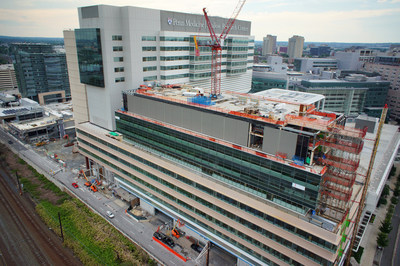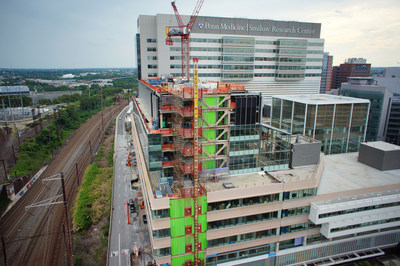Novartis AG, University of Pennsylvania Partner On $20 Million New Heart Center; Will Staff 100

September 12, 2014
By Mark Terry, BioSpace.com Breaking News Staff
The University of Pennsylvania announced plans to partner with Novartis AG for the construction of a new Center for Advanced Cellular Therapeutics (CACT) as part of is Penn Medicine campus in Philadelphia. The new center will start with $20 million in funding and could create 100 jobs in specialized fields.
The CACT will research and develop therapies that utilize Chimeric Antigen Receptor (CAR) technology. At least 100 technical and scientific jobs are expected to be generated.
The CACT collaboration is part of a Penn-Novartis alliance announced in August 2012. Penn and Novartis inked an exclusive global research and licensing agreement to develop and commercialize CAR technology and products.
CAR technology involves taking a patient’s specialized immune cells, or T cells, out of their body in order to reprogram them to target specific types of cancer cells, then reintroducing them into the patient’s body. The T cells then hunt down and hopefully destroy existing cancer cells. The U.S. Food and Drug Administration gave Penn’s CTL019, an investigational CAR therapy, Breakthrough Designation in July 2014.
The investigational therapy is promising for the treatment of relapsed and refractory adult and pediatric acute lymphoblastic leukemia (ALL). In December 2013 the Penn team working on the therapy published data from a study of about 60 patients that found significant positive results. Approximately 89 percent of the patients involved in the trial were in remission within just a few weeks. The data was presented at the American Society of Hematology’s annual meeting.
Penn expects the new CACT facility to be completed in 2016. It will be 30,000 square feet and located toward the back of the Perelman Center for Advanced Medicine on Penn Medicine’s University City campus. It will be constructed on top of the 8-story Jordan Medical Education Center and South Pavilion Extension, which is currently under construction.
“The part five years have been a time of explosive, exciting progress in the field of cancer cellular therapy,” said Carl H. June, the Richard W. Vague Professor of Immunotherapy. “The results we’ve seen among the leukemia patients we’ve treated using our ‘hunter’ cells have accelerated our expectations for the potential of these new therapies.”
In addition to June, the Penn research teams will include: David Porter, Jodi Fisher Horowitz Professor in Leukemia Care Excellence and director of Blood and Marrow Transplantation in the Abramson Cancer Center; Noelle Frey, assistant professor of Medicine in the Abramson Cancer Center; Stephan Grupp, the Yetta Deitch Novotny Professor of Pediatrics and director of Translational Research in the Center for Childhood Cancer Research at the Children’s Hospital of Philadelphia; and Bruce Levine, the Barbara and Edward Netter Professor in Cancer Gene Therapy in the department of Pathology and Laboratory Medicine, and director of Penn’s Clinical Cell and Vaccine Production Facility.

|

|
